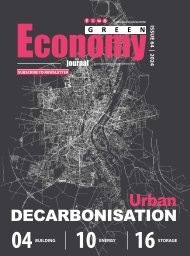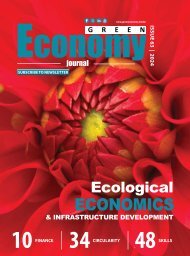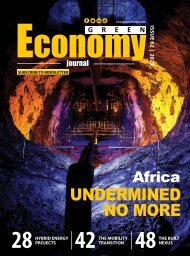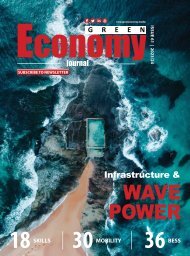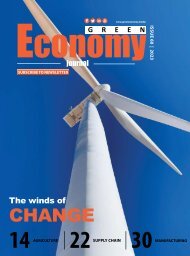Create successful ePaper yourself
Turn your PDF publications into a flip-book with our unique Google optimized e-Paper software.
SKILLS<br />
SKILLS<br />
LOCAL DEVELOPMENT<br />
South Africa introduced the Renewable Energy Independent Power<br />
Producer Procurement Programme (REI4P) to stimulate private<br />
investment through competitive tenders in green technologies.<br />
From inception (in 2011) to date, it has resulted in over 6GW of<br />
new renewables generation capacity, mainly wind and solar. It is<br />
estimated that the REI4P has created 18 000 jobs in manufacturing,<br />
installation and maintenance. Though construction jobs are<br />
usually temporary, the programme also includes requirements for<br />
local content that are designed to promote local manufacturing<br />
of renewable energy components and support skills development<br />
for workers over time. Companies have a contractual obligation<br />
to support local socioeconomic outcomes over the lifetime<br />
of a project (around 20 years), including for education and<br />
skills development.<br />
Projects must demonstrate 40% South African ownership, which<br />
enables knowledge sharing between local developers and foreign<br />
operators. Several foreign project developers sent a wide array of<br />
staff to work in South Africa to cover areas such as negotiations and<br />
contract agreements, construction, supply chain development,<br />
financing and legal services. Given the limited presence of these<br />
specialised skills in South Africa, the implementation of projects<br />
led to sizeable levels of knowledge sharing with local firms in the<br />
legal, banking, engineering and advisory fields.<br />
In 2015, the government launched the South African Renewable<br />
Energy Technology Centre (SARETEC) to develop local green<br />
skills in response to the demand created by REI4P. SARETEC was<br />
established at the Cape Peninsula University of Technolog, in<br />
Cape Town. The institution offers specialised and accredited<br />
training for the renewable energy industry. Its courses are designed<br />
to address the skills needs stemming from the REI4P, especially<br />
as they relate to the long-term operation and maintenance of<br />
projects. A slowdown in the REI4P policy implementation has<br />
impeded some progress in recent years, however.<br />
Competition, commissioned Trade & Industrial Policy Strategies<br />
(TIPS) to carry out a National Employment Vulnerability Assessment<br />
(NEVA) to evaluate the impacts that climate change would have<br />
on companies, workers and communities along the value chain<br />
in the following sectors: coal, metals, petroleum-based transport,<br />
agriculture and tourism.<br />
The 2019 NEVA found that South Africa’s coal mining sector, which<br />
is highly concentrated among a few companies, employed around<br />
89 000 workers in 2018 and accounted for 20% of mining jobs in the<br />
country. That same year, state-owned utility Eskom employed 50 000<br />
workers, while petrochemical company Sasol had 26 000 workers<br />
in South Africa. The NEVA identified four main risk factors for the<br />
country’s coal value chain, including longer-term risks from abroad<br />
that importers reduce demand for South African coal; global efforts<br />
to cut coal consumption mount; domestic risks that consumers lower<br />
their demand for coal-fired electricity due to an expansion of renewables,<br />
as well as efficiency and policies for lower carbon intensity from<br />
electricity generation.<br />
To complement the NEVA, the country’s National Climate Change<br />
Response White Paper requires the development of a Sector Jobs<br />
Resilience Plan (SJRP) for each value chain. The SJRPs aim to assess<br />
opportunities to transition these sectors to green jobs and industries<br />
as well as to protect vulnerable groups that will be impacted by<br />
the changes.<br />
For coal, the SJRP estimated in 2020 that value chain employment<br />
is more than 120 000 workers, out of which 80 000 work in coal<br />
mining, the largest employment sector. The power generation sector<br />
(Eskom) accounts for 12 000 jobs, the petrochemicals sector (Sasol)<br />
for 26 000, and small coal truckers for 2 000 jobs. A total of 15% of the<br />
workers in the coal value chain are women.<br />
The SJRP framework, in addition to guaging the scale of<br />
displacement expected in a region, also offers recommendations<br />
for adjustment. It notes various areas for diversification, including<br />
in the renewable energy value chain through skills development in<br />
the maintenance and repair of renewable generation equipment and<br />
the manufacture of renewables generation components and related<br />
services. Another area for diversification is beneficiation of coal<br />
waste products, which would require skills training and education to<br />
transition workers from coal mining and power plants, preceded by<br />
a thorough assessment of the potential for ash beneficiation. Lastly,<br />
the framework also identifies mine rehabilitation and repurposing as<br />
a diversification option.<br />
OTHER SECTORS<br />
The skills of oil and gas workers can be transferable to other<br />
energy sectors. For instance, petroleum engineering skills are<br />
pertinent to geothermal activities, while chemical engineering<br />
skills used in oil refineries are applicable to the production of<br />
clean fuels and hydrogen. The offshore petroleum sector’s skills<br />
are relevant for offshore wind, carbon capture and storage, and<br />
hydrogen. Meanwhile, oil and gas power plant operators, turbine<br />
manufacturers and construction workers can apply their skills to<br />
clean energy power plants, as well as upgraded technologies to use<br />
hydrogen and other innovative clean fuels in the future.<br />
The automotive sector is also poised for a major shake-up as<br />
emissions reduction policies increase the uptake of electric vehicles<br />
over traditional combustion models. The IEA’s World Energy<br />
Employment report estimates 13.6-million people were employed<br />
Coal power employs two-million<br />
people globally, most of whom<br />
are informal workers.<br />
in road vehicle manufacturing in 2019, accounting for around 2.5%<br />
of total global manufacturing jobs. Given that electric vehicles have<br />
fewer components and simpler assemblies, EV manufacturing could<br />
have a lower labour intensity compared to internal combustion<br />
engine (ICE) vehicles. However, when considering the full value chain<br />
READ REPORT<br />
Companies may face a lack of skilled<br />
workers that match the skillsets needed for a<br />
project in the region it is located.<br />
This article is an excerpt from the report by the International Energy Agency entitled SKILLS DEVELOPMENT AND INCLUSIVITY FOR<br />
CLEAN ENERGY TRANSITIONS published in September 2022.<br />
SOLAR TRAINING + INTERNSHIPS FOR 100 SA YOUTHS<br />
GREEN Solar Academy has partnered with KP Cares to offer professional solar training paired with on-the-job experience to<br />
technically inclined youngsters across South Africa. The overall objective of the training programme is to skill up participants<br />
and expose them to first-job experience so that they can find sustainable employment in the solar photovoltaic (PV) industry.<br />
KP Cares is piloting the training in three provinces in the first year which commenced in July 2022. A total of 28 young people were<br />
selected for solar training paired with an internship programme. GREEN will facilitate visits to live solar plants so that the students are<br />
introduced to typical operation and maintenance (O&M) tasks. Once the work skills programme is complete, possible employment options<br />
will include PV mounter for commercial and utility-scale PV installations, or O&M technician with the trainees capable of carrying out tasks<br />
such as installation and cleaning of PV modules, wiring and installation as well as technical checks on PV systems. The trainees will be added<br />
to the GREEN alumni network where they will have access to other installers and professional exchange to help develop their careers further.<br />
Through GREEN, KP Cares aims to upskill and give work experience to 100 solar installers during the course of the project. If you wish to<br />
get involved, please visit www.solar-training.org.<br />
THOUGHT [ECO]NOMY<br />
greeneconomy/report recycle<br />
Global <strong>Green</strong><br />
Skills Report 2022<br />
of production, including batteries and electric charging infrastructure,<br />
EVs could have a comparable labour intensity to conventional<br />
vehicles. Still, automobile workers will require support to shift their<br />
skillsets from the production of ICE vehicles to EVs, with appropriate<br />
consideration to wages and worker displacement.<br />
GLOBAL GREEN SKILLS REPORT 2022 | LinkedIn Economic Graph | [2022]<br />
We are faced with an urgent need to transition our society to a green economy to address the threat of<br />
climate change. How do we apply what we’ve learned from this unprecedented moment to power the<br />
enormous transition that needs to happen to meet the climate crisis?<br />
Ryan Roslansky, CEO of LinkedIn, says in the foreword of this report: “Achieving our collective global climate<br />
targets is a monumental task and it is going to take a whole-of-economy effort to make it happen. That means<br />
we need a transformation in the skills and jobs people have if we’re going to get there. The good news is that<br />
we are already seeing a shift to green skills and jobs underway on our platform, which has nearly 800-million<br />
members around the world.<br />
“<strong>Green</strong> talent in the workforce worldwide is rising. The share of green talent increased from 9.6% in 2015 to<br />
13.3% in 2021 (38.5%). Jobs are a critical part of the conversation about achieving this green transition. And<br />
rightly so. We expect to see millions of new jobs created globally in the next decade driven by new climate<br />
policies and commitments.<br />
“It’s more than jobs – we need to zoom in on the skills that power these jobs. <strong>Green</strong> skills. We believe real change will come through a skills-based<br />
approach to opportunity. We have seen double-digit growth across dozens of green skills over the last five years. The fastest growing green skills are in<br />
ecosystem management, environmental policy and pollution prevention. But most green skills are being used in jobs that aren’t traditionally thought<br />
of as green – such as fleet managers, data scientists or health workers.”<br />
LinkedIn’s green skills report leverages its unique data and labour market expertise to highlight actionable insights that are crucial to delivering a<br />
successful green transition and avoiding potential pitfalls.<br />
64<br />
65




